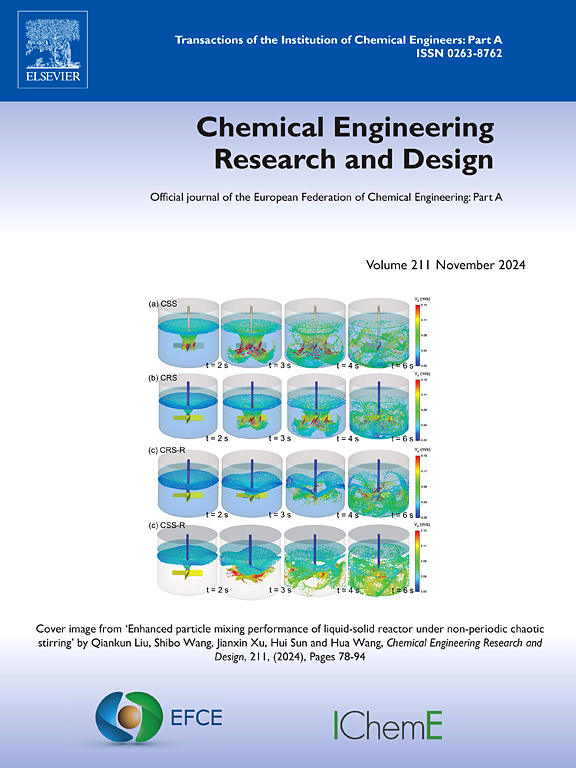Influence of operating parameters on separation performance of air gap diffusion distillation for recovering ammonia from ammonia-nitrogen wastewater
IF 3.7
3区 工程技术
Q2 ENGINEERING, CHEMICAL
引用次数: 0
Abstract
This study proposes air gap diffusion distillation (AGDD) for recovering ammonia from ammonia nitrogen wastewater. The influences of several key parameters on the AGDD performance have been explored. The findings indicate that increasing the feed temperature improves the concentration factor (CF) and reduces the specific thermal energy consumption for ammonia recovery (STEC-N). Cooling water temperature on ammonia flux is higher than that of water flux. An increase in feed flowrate attenuates the boundary layer, substantially enhancing the ammonia flux relative to the water flux and boosting the CF. The effect of feed concentration on total flux is determined to be insignificant. When the air gap thickness is less than 8 mm, molecular diffusion dominates the mass transfer in the air gap, the water flux and ammonia flux decrease with the increase of the air gap thickness, and the CF reaches a peak of about 5.7 near 5 mm. However, when the air gap thickness is greater than 8 mm, natural convection dominates the mass transfer in the air gap. This weakens the negative impact of increased air gap thickness on total flux. This leads to a certain increase in CF, which is more pronounced at higher temperatures. Finally, a dimensionless equation for the mass transfer within the air gap was determined from temperature measurements at different spatial locations within the AGDD unit.
操作参数对气隙扩散蒸馏从氨氮废水中回收氨的分离性能的影响
本研究提出用气隙扩散蒸馏法(AGDD)从氨氮废水中回收氨。研究探讨了几个关键参数对 AGDD 性能的影响。研究结果表明,提高进料温度可提高浓缩系数(CF),降低氨回收的比热能消耗(STEC-N)。冷却水温度对氨通量的影响大于对水通量的影响。进料流速的增加会减弱边界层,从而大幅提高氨通量(相对于水通量而言),并提高浓缩系数(CF)。进料浓度对总通量的影响不大。当气隙厚度小于 8 毫米时,气隙中的传质以分子扩散为主,水通量和氨通量随气隙厚度的增加而减少,CF 在 5 毫米附近达到约 5.7 的峰值。然而,当气隙厚度大于 8 mm 时,气隙中的传质以自然对流为主。这削弱了气隙厚度增加对总通量的负面影响。这导致 CF 有一定程度的增加,在温度较高时更为明显。最后,根据 AGDD 单元内不同空间位置的温度测量值,确定了气隙内传质的无量纲方程。
本文章由计算机程序翻译,如有差异,请以英文原文为准。
求助全文
约1分钟内获得全文
求助全文
来源期刊

Chemical Engineering Research & Design
工程技术-工程:化工
CiteScore
6.10
自引率
7.70%
发文量
623
审稿时长
42 days
期刊介绍:
ChERD aims to be the principal international journal for publication of high quality, original papers in chemical engineering.
Papers showing how research results can be used in chemical engineering design, and accounts of experimental or theoretical research work bringing new perspectives to established principles, highlighting unsolved problems or indicating directions for future research, are particularly welcome. Contributions that deal with new developments in plant or processes and that can be given quantitative expression are encouraged. The journal is especially interested in papers that extend the boundaries of traditional chemical engineering.
 求助内容:
求助内容: 应助结果提醒方式:
应助结果提醒方式:


